CELLULAR INTERACTIONS RESPONSIBLE FOR DEVELOPMENT, MAINTENANCE, AND STRENGTH OF THE SKELETON
With
Prof Natalie A Sims, PhD.
Deputy Director, St. Vincent’s Institute,
Melbourne, Australia
RESEARCHER PROFILE
Filmed in Melbourne, Australia | May 2025
Professor Sims directs the Bone Cell Biology and Disease Unit at St. Vincent’s Institute of Medical Research and is a Professorial Fellow at The University of Melbourne and Australian Catholic University.
She leads a team who studies the cellular interactions responsible for development, maintenance, and strength of the skeleton. She completed her PhD at the University of Adelaide, followed by postdoctoral work at the Garvan Institute in Sydney then at Yale School of Medicine, in New Haven, Connecticut, where she studied the role of the estrogen receptor in regulating bone structure.
She returned to Australia in 2001 to set up a laboratory at St. Vincent’s Hospital and SVI. Her laboratory studies the cellular interactions responsible for development, maintenance, and strength of the skeleton, including the IL-6 family of cytokines, using genetically altered mouse models, in vitro system and human specimens. She has published more than 140 peer reviewed original research articles, 48 peer reviewed review articles and commentaries, and 20 published chapters; H index of 64 (Scopus); more than 13,500 career citations.
Her work has been recognised by awards from her colleagues internationally, including the International Bone and Mineral Society Herbert A Fleisch Award (2013) and the American Society of Bone and Mineral Research (ASBMR) Fuller Albright Award (2010) and Paula Stern Award (2020).
She is a Deputy Editor of the Journal of Bone and Mineral Research and serves on the Editorial Board of the Journal of Biological Chemistry. She has served as President of the Australia and New Zealand Bone and Mineral Society and is currently Executive Secretary of the International Federation of Musculoskeletal Research Societies.
Source: Supplied
You Might also like
-
Dr Nischal Sahai
RESEARCH IN BRAIN COMPUTER INTERFACE
@ SYNCHRON
MELBOURNE, VICTORIA, AUSTRALIA -
Outcomes of Corneal Allergenic Intrastromal Ring Segment (CAIRS) Surgery
Dr David Gunn is an ophthalmologist specialising in cornea, cataract, and refractive surgery at the Queensland Eye Institute and Focus Vision in Brisbane, Queensland. His journey into ophthalmology began during medical school, inspired by a mentor. His current research examines outcomes for patients undergoing Corneal Allergenic Intrastromal Ring Segment (CAIRS) surgery.
-
Impact of Leukaemia Foundation’s Research Funding into Blood Cancer
Bill Stavreski is the Head of Research at the Leukaemia Foundation who talks about the research impact in recent years. The Foundation itself marks its 25th anniversary in 2025, having funded a wide range of health and medical research since 2000. With a focus on basic science, health services research, treatment, and care, the organisation has invested nearly $90 million (adjusted in current dollars terms) in approximately 370 research grants over the years.



